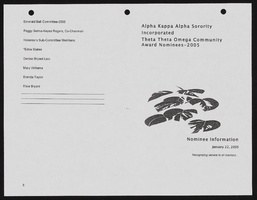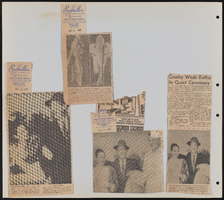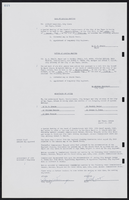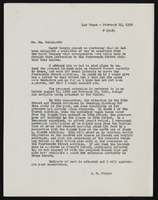Search the Special Collections and Archives Portal
Search Results
Mary Melton oral history interview
Identifier
Abstract
Oral history interview with Mary Carol Melton conducted by Kathy Ricks on March 05, 1981 for the Ralph Roske Oral History Project on Early Las Vegas. Melton discusses early life in Henderson, Nevada and recalls the development of the United Methodist Church in Las Vegas, Nevada. Melton speaks about moving to Las Vegas because of her husband’s health, her time working with attorney offices and in the Las Vegas Courthouse, and the different homes in which her family lived. Moreover, Melton talks extensively about starting the first Sunday school in North Las Vegas in a garage as well as the church she and her husband built. Melton discusses the programs and minstrels performed in the church, the crafts sold to make money for the church and the organ they purchased. Lastly, Melton talks about going to the Hoover Dam nearly every week to see new developments, her participation in the Daughters of the American Revolution (DAR), and watching the above ground atomic tests.
Archival Collection
Lee Washington oral history interview
Identifier
Abstract
Oral history interview with Lee Washington conducted by Aleya Ford Wheaton on November 30, 2014 for the African Americans in Las Vegas: a Collaborative Oral History Project. In this interview, Washington discusses his personal history, moving to Las Vegas, Nevada in 1963, and his initial reactions to the city. He talks about his employment at the Tropicana Hotel and Casino as well as joining the Culinary Workers Union in 1974. Washington then describes church activity that he and his family were involved in at Most High Church and his church's significance to the West Las Vegas community. Lastly, he talks about the development and growth of businesses on the Westside.
Archival Collection

Photograph of Ada Lake's Sunday school class, Las Vegas, circa 1917
Date
Archival Collection
Description
Image
Maxine Butler oral history interview
Identifier
Abstract
Oral history interview with Maxine Butler conducted by Frank Johnson on April 22, 2016 for the African Americans in Las Vegas: a Collaborative Oral History Project. In this interview, Butler discusses her early life in Jonesboro, Louisiana. She talks about moving to Las Vegas, Nevada in 1965, the Westside, and businesses on Jackson Street. Butler recalls working at The Cove as a cocktail waitress, the reopening of Moulin Rouge Hotel, and the African American community on the Westside. Later, Butler discusses her involvement at Greater Evergreen Missionary Baptist Church, the importance of church to the African American community, and compares church life in Jonesboro and Las Vegas. Lastly, Butler talks about changes in the Westside.
Archival Collection

Alpha Kappa Alpha Sorority, Theta Theta Omega Chapter community award nominees list
Date
Archival Collection
Description
From the Alpha Kappa Alpha Sorority, Incorporated, Theta Theta Omega Chapter Records (MS-01014) -- Chapter records file.
Text

Transcript of interview with Sally Halko by Roberta Farmer, March 11, 1978
Date
Archival Collection
Description
On March 11, 1978, Roberta Farmer interviewed Sally Halko (born 1921 in Gowen, Oklahoma) about her life in Las Vegas, Nevada. Halko first talks about her family background, education, traveling, and church membership. She later talks about the development Las Vegas casinos, racial minorities, housing growth, Lake Mead, and the first theaters.
Text
Dixie and Neil Brundy oral history interview
Identifier
Abstract
Oral history interview with Dixie and Neil Brundy conducted by Claytee D. White on July 01, 2014 for the Boyer Early Las Vegas Oral History Project. The Brundys describe life in rural Nevada and in Las Vegas, Nevada pre- and post- World War II: working on the railroads, barrel-racing, and rodeos. They also talk about their family’s involvement in the Church of Jesus Christ of Latter-day Saints. They recall the glamour of Las Vegas casinos when they were owned and operated by the mob and the country music stars who performed downtown.
Archival Collection



